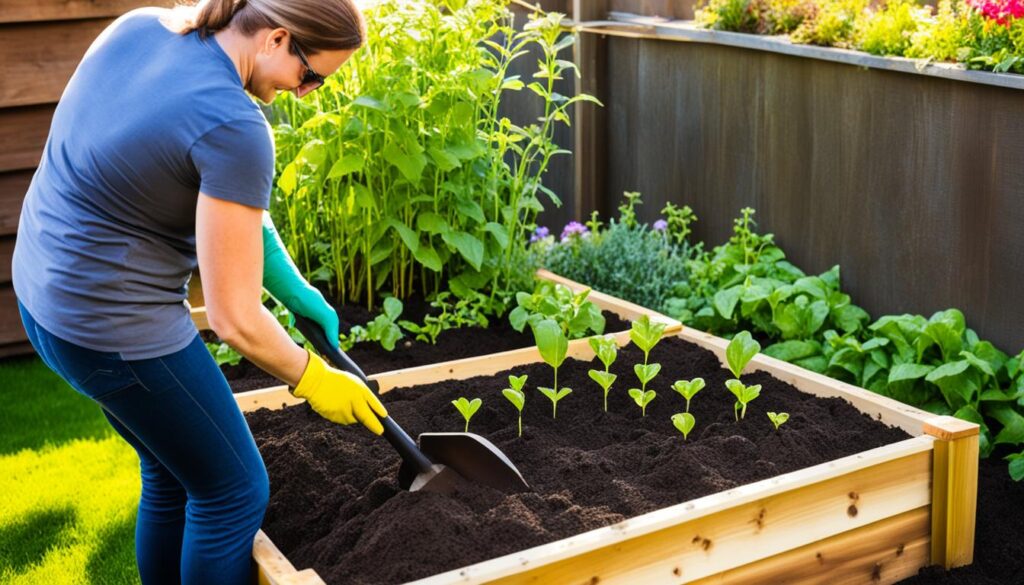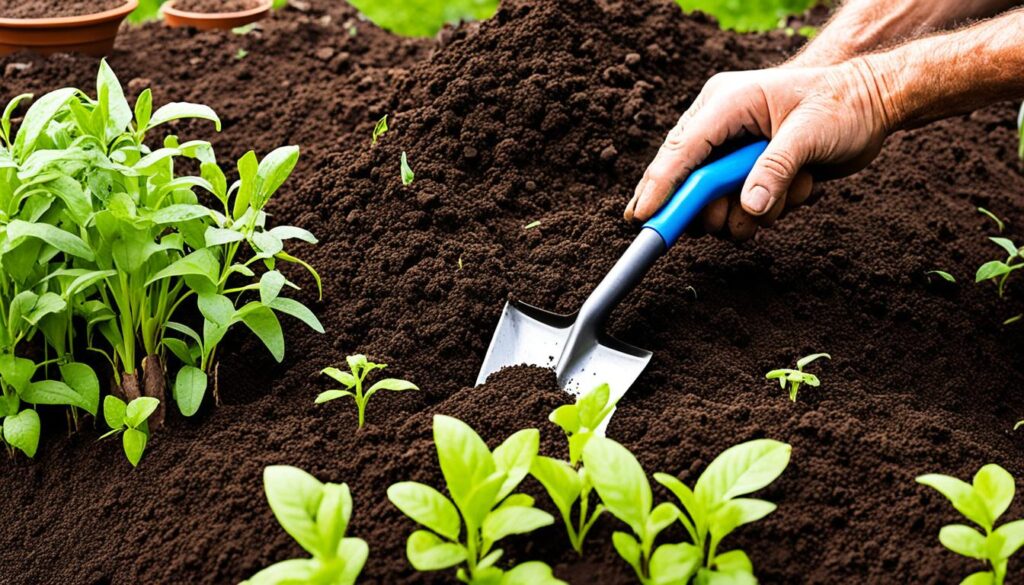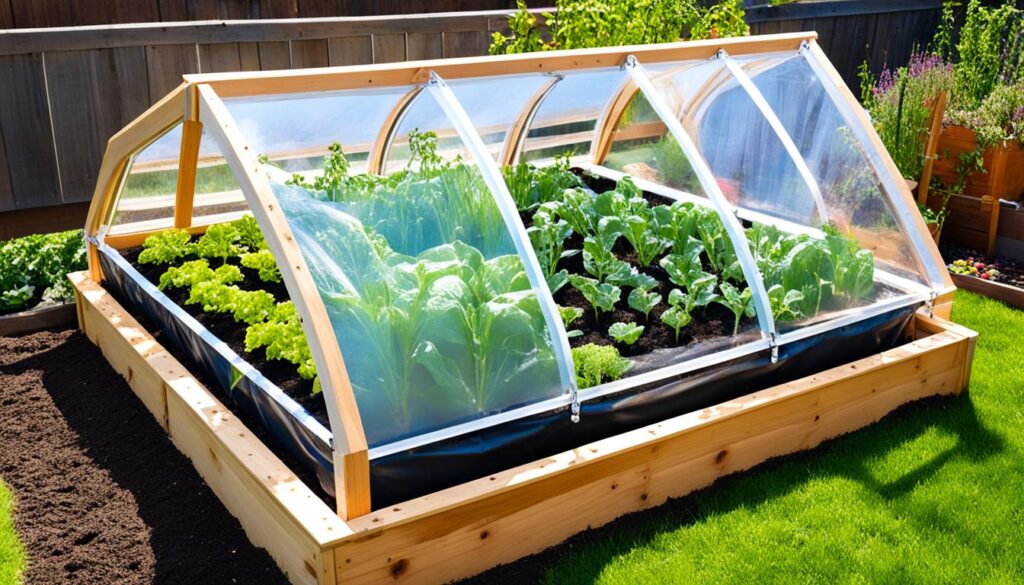Gardening has long been recognized as a therapeutic activity with numerous mental health benefits. Research has shown that gardening can reduce stress and depression by providing an opportunity for immersion in a natural scene and engagement in a positive creative activity. It can also create a sense of calm, relaxation, competence, enjoyment, curiosity, and hope. Additionally, gardening has been shown to have therapeutic effects for individuals with dementia, reducing stress and agitation while improving attention and sleep patterns. It can also be beneficial for prisoners with a history of substance abuse, reducing hostility, risk-taking, and depression. The physical activity involved in gardening can also contribute to maintaining a healthy weight and increasing bone intensity.
Gardening provides a refuge and a sense of purpose, making it a valuable form of therapy for mental health.
Key Takeaways:
- Gardening can reduce stress and depression
- It promotes a sense of calm, relaxation, and enjoyment
- Gardening has therapeutic effects for individuals with dementia
- It can help reduce hostility, risk-taking, and depression in prisoners with substance abuse issues
- Engaging in gardening can contribute to maintaining a healthy weight and increasing bone intensity
The Physical Benefits of Gardening
Gardening is not only a great way to connect with nature and find peace of mind, but it also offers several physical benefits that contribute to overall health and well-being. Engaging in regular gardening activities can help burn calories, maintain a healthy weight, and increase bone intensity.
Calorie Burn in Gardening
Gardening is a physical activity that can burn 200-500 calories per hour. Whether you’re pulling weeds, digging holes, or watering plants, each gardening task requires effort and energy. This calorie burn not only helps you maintain a healthy weight but also reduces the risk of obesity.
By spending time in the garden, you can turn gardening into an enjoyable exercise routine that combines physical activity with the pleasure of nurturing plants. Plus, the beauty of gardening is that you can engage in it for longer periods without feeling like you’re working out.
Bone Intensity in Gardening
Did you know that gardening is the second-best activity for increasing bone intensity, right after weight training? The physical demands of digging, planting, and carrying pots or bags of soil require strength and put stress on your bones, which helps in maintaining bone density.
By regularly engaging in gardening activities, you’re giving your bones a workout, which is crucial for maintaining strong and healthy bones as you age. So, not only does gardening provide physical benefits in terms of burning calories but it also contributes to your overall bone health.
Overall, gardening is an excellent way to stay physically active and reap the associated benefits. It improves cardiovascular health, enhances strength, flexibility, and endurance, and is a fun and rewarding way to take care of your physical well-being.
The Mental Health Benefits of Gardening
Gardening offers numerous mental health benefits that contribute to overall emotional well-being. Studies have demonstrated its ability to effectively reduce stress levels and associated depression. Immersion in a natural scene and active engagement in the creative activity of gardening can provide individuals with a therapeutic escape from the pressures of everyday life.
For many, the garden serves as a refuge, promoting a sense of calm and relaxation. The act of tending to plants and nurturing their growth can be deeply satisfying, providing a sense of purpose and achievement. The rhythmic tasks involved in gardening, such as planting seeds or pruning, can create a meditative state of mind, allowing individuals to find solace and respite from the demands of their daily routines.
Gardening also fosters a range of positive emotions including competence, enjoyment, curiosity, and hope. The process of watching plants grow and thrive can instil a sense of pride and accomplishment. The joy of witnessing vibrant blooms or harvesting homegrown produce can bring great satisfaction and a sense of achievement. Additionally, the organic and cyclical nature of gardening encourages curiosity as individuals learn about the different species of plants, their specific needs, and the natural processes that sustain life.
Furthermore, gardening can act as a therapeutic activity, providing individuals with an outlet to express and process their emotions. Through nurturing plants, individuals can channel their energies into something positive. The hands-on nature of gardening can serve as a form of physical and mental therapy, offering a creative and constructive way to cope with stress, anxiety, and depression.
By engaging in gardening activities, individuals can tap into the mental health benefits it provides. Whether it’s tending to a small pot of herbs or cultivating an entire backyard garden, gardening offers a therapeutic escape, allowing individuals to find solace, restoration, and a sense of well-being amidst the greenery.

| Mental Health Benefits of Gardening |
|---|
| Reduces stress and associated depression |
| Promotes a sense of calm and relaxation |
| Enhances feelings of competence, enjoyment, curiosity, and hope |
| Provides a therapeutic outlet for emotional expression |
Gardening for Dementia Patients
Gardening can have therapeutic effects for individuals with dementia, providing a meaningful and purposeful activity that supports their overall well-being. Research has shown that horticultural therapy can improve attention, reduce stress and agitation, and even improve sleep patterns in dementia patients.
The calming and soothing environment created by gardening can have a positive impact on individuals with dementia. It provides a sense of connection to nature and serves as a positive outlet for their energy. Engaging in gardening activities allows them to feel productive and engaged, promoting a sense of purpose.

Furthermore, the non-pharmacological approach of gardening helps reduce the reliance on medications to manage symptoms. It provides a natural and holistic way to support the well-being of dementia sufferers.
Gardening also offers sensory stimulation, allowing individuals with dementia to interact with various textures, colors, and scents. This sensory engagement can enhance cognitive function and provide enjoyment and fulfillment.
To demonstrate the therapeutic effects of gardening for dementia patients, here is a table highlighting the specific benefits:
| Therapeutic Effects of Gardening for Dementia Patients |
|---|
| Improvement of attention |
| Reduction of stress and agitation |
| Improvement of sleep patterns |
| Creation of a calming and soothing environment |
| Sensory stimulation and engagement |
By incorporating gardening as a therapeutic activity for dementia patients, we can enhance their quality of life, promote their well-being, and create an environment that fosters happiness and fulfillment.
Gardening as Therapy for Substance Misuse
Research has shown that gardening has therapeutic effects for individuals with a history of substance abuse.
Gardening can help reduce feelings of hostility, risk-taking, and depression among prisoners struggling with substance misuse issues. The patient and nurturing nature of gardening helps individuals develop patience and reduce the impulse for instant gratification, which is often a driver of substance abuse.
Moreover, the sense of purpose that gardening provides can be extremely beneficial for individuals in recovery. Engaging in gardening allows them to focus their energy on a positive and productive activity, contributing to their overall well-being.
Gardening serves as a therapeutic outlet for individuals battling substance misuse, promoting their recovery process and supporting their mental health.
| Therapeutic Effects of Gardening for Substance Misuse | Reduction of Risk-Taking and Depression |
|---|---|
| Gardening helps individuals develop patience and reduce impulsivity, reducing the risk of relapse. | Gardening creates a positive and productive outlet for individuals in recovery, reducing feelings of depression. |
| Gardening promotes a sense of purpose, helping individuals focus their energy on a meaningful activity. | Gardening provides a sense of accomplishment, boosting self-esteem and reducing the likelihood of engaging in risk-taking behaviors. |
| Gardening allows individuals to connect with nature and create a nurturing environment, fostering healing and growth. | The therapeutic effects of gardening can contribute to overall well-being and aid in the recovery process. |
Gardening for Weight Management
Gardening is not only a relaxing and fulfilling hobby but also a fantastic way to manage your weight and promote overall health. The physical activity involved in gardening can help you burn calories and maintain a healthy weight. In fact, just one hour of gardening can burn anywhere from 200 to 500 calories.
When you engage in gardening activities such as digging, weeding, and planting, you’re not only tending to your plants but also engaging in a moderate-intensity workout. These activities require movement and effort, contributing to increased calorie burn and improved fitness.
Gardening offers a unique and enjoyable alternative to traditional forms of exercise. Instead of hitting the gym or going for a run, you can spend time in your garden, tending to your plants, and reaping the benefits of physical activity.
| Activity | Calories Burned per Hour |
|---|---|
| Digging | 200-400 |
| Weeding | 200-300 |
| Planting | 200-300 |
Aside from helping you burn calories, gardening also provides access to fresh produce, which can support a healthy eating program. When you grow your own fruits, vegetables, and herbs, you have a convenient and sustainable source of nutritious food right in your backyard. By including fresh produce from your garden in your meals, you can maintain a balanced diet and support your weight management goals.

So, if you’re looking for a fun and effective way to manage your weight, look no further than gardening. Not only will you enjoy the physical activity and calorie burn, but you’ll also have the satisfaction of growing your own food and enjoying the benefits of fresh produce.
Recommended Resources for Gardening and Mental Health
For those interested in exploring gardening as a therapeutic activity for mental health, there are numerous resources available. Here are some recommended books and websites that provide valuable information and guidance:
Books:
- The Well-Gardened Mind by Sue Stuart-Smith: This insightful book explores the therapeutic power of gardening and delves into the symbolism and metaphorical aspects of cultivating plants. It offers a deep understanding of how gardening can positively impact mental well-being.
- (Add your own recommended book and a brief description)
These books can serve as valuable resources for anyone looking to incorporate gardening into their mental health journey.
Websites:
- Royal Horticultural Society (RHS): The RHS provides a wealth of information and resources on gardening for mental health. Their website offers tips for getting started, articles on the benefits of gardening, and book recommendations.
- National Garden Scheme: The National Garden Scheme website offers access to gardens and garden therapy projects across the UK. It provides valuable information on the benefits of gardening and opportunities to connect with like-minded individuals.
- Thrive: Thrive is a UK-based charity that uses gardening to bring about positive changes in the lives of individuals living with disabilities or ill-health. Their website offers resources and information on therapeutic gardening techniques.
- Garden Organic: Garden Organic is a leading charity promoting organic gardening. Their website offers resources and information on therapeutic gardening, emphasizing the benefits of organic practices for mental well-being.
| Resource | Description |
|---|---|
| Royal Horticultural Society (RHS) | The RHS website offers a wide range of information and resources on gardening for mental health, including books, articles, and tips for getting started. |
| National Garden Scheme | The National Garden Scheme website provides valuable information on the benefits of gardening and offers access to gardens and garden therapy projects across the UK. |
| Thrive | Thrive is a UK-based charity that uses gardening to bring about positive changes in the lives of individuals living with disabilities or ill-health. Their website offers resources and information on therapeutic gardening techniques. |
| Garden Organic | Garden Organic is a leading charity promoting organic gardening. Their website offers resources and information on therapeutic gardening, emphasizing the benefits of organic practices for mental well-being. |
Creating a Therapeutic Garden
To create a therapeutic garden, there are certain elements to consider. These include incorporating natural elements such as plants, water features, and wildlife habitats to create a calming and soothing environment. Providing seating areas and paths for relaxation and reflection can also contribute to the therapeutic nature of the garden. It is important to design the garden with accessibility in mind, ensuring that individuals of all abilities can engage in gardening activities. Creating spaces for sensory engagement, such as fragrant plants and tactile elements, can further enhance the therapeutic experience. Ultimately, the goal is to create a garden that promotes a sense of calm, connection to nature, and overall well-being.
| Elements of a Therapeutic Garden |
|---|
| Incorporate natural elements such as plants, water features, and wildlife habitats |
| Create seating areas and paths for relaxation and reflection |
| Design the garden with accessibility in mind |
| Create spaces for sensory engagement, such as fragrant plants and tactile elements |
The Future of Therapeutic Gardening
The benefits of therapeutic gardening are gaining recognition within the healthcare system. There is a growing call for greater integration of gardening in the National Health Service (NHS) and public health policies in order to maximize the potential benefits for mental health.
Healthcare providers are now prescribing gardening as a cost-effective and accessible form of therapy for mental health conditions. As research continues to support the therapeutic benefits of gardening, its integration into healthcare is expected to expand, providing more individuals with access to this valuable form of therapy.
Gardening has the potential to contribute significantly to public health policies, addressing mental health issues and promoting overall well-being. The inclusion of gardening as a recommended activity in public health policies would increase awareness of its benefits and encourage more people to engage in therapeutic gardening.
“Gardening has the ability to improve mental health and well-being, and its integration within healthcare and public health policies can amplify its positive impact.” – [Author Name]
The Benefits of Integrating Gardening in Healthcare and Public Health Policy
The integration of gardening in healthcare and public health policy has several benefits:
- Improved Mental Health: Gardening has been proven to reduce stress levels, enhance relaxation, and provide a sense of purpose and connection to nature, all of which are essential for good mental health.
- Cost-Effectiveness: Gardening is a cost-effective therapy that can be easily incorporated into treatment plans and community health programs, making it accessible to individuals from diverse backgrounds.
- Community Engagement: Gardening promotes social interaction and community engagement, fostering a sense of belonging and support among individuals participating in shared gardening activities.
- Sustainable Health Practices: Gardening encourages sustainable health practices by promoting physical activity, outdoor exposure, and access to fresh produce, which contribute to overall well-being.
By integrating gardening into healthcare and public health policies, we can harness the potential of therapeutic gardening to improve mental health, reduce healthcare costs, and create healthier and happier communities.
Conclusion
Gardening is a powerful therapeutic activity with numerous mental health benefits. Its ability to reduce stress, promote relaxation, and provide a sense of purpose and connection to nature makes it an ideal form of therapy for individuals struggling with mental health conditions. Whether it’s through growing vegetables, tending to flowers, or creating a tranquil garden space, gardening can significantly improve overall well-being and contribute to a healthier and happier life.
By recognizing the healing powers of gardening and incorporating it into our lives, we can transform our mental health and experience the therapeutic benefits of the natural world. The act of immersing ourselves in nature and engaging in a positive creative activity can have profound effects on our mental well-being. Gardening offers a sense of fulfillment, calmness, and hope, providing refuge from the stresses of daily life.
Overall, therapeutic gardening provides an accessible and cost-effective form of therapy for mental health. The benefits extend beyond just the individual, as gardening can also foster a sense of community and connection. Whether it’s in a small backyard garden or a community allotment, the act of gardening brings people together, creating a supportive and inclusive environment. Through gardening, we can cultivate not only plants but also a healthier and happier society.








